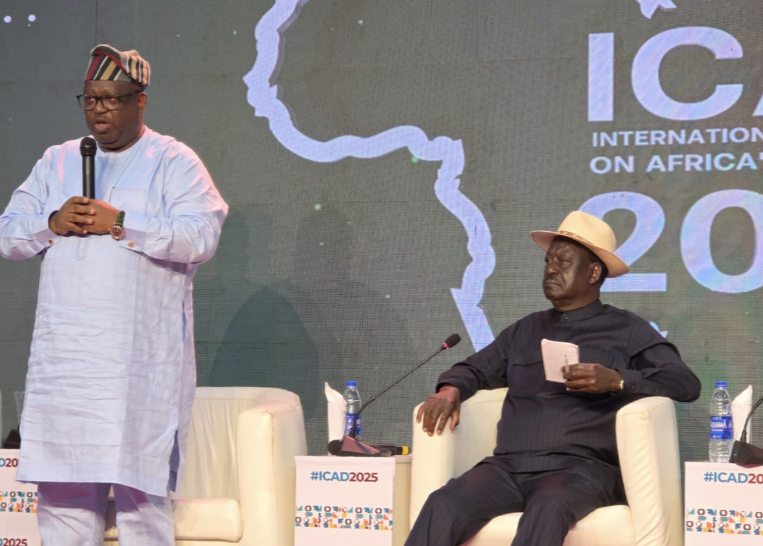
 ODM leader Raila Odinga at the ICAD 2025 summit in Abuja, Nigeria, July 23, 2025. /RAILAODINGA/X
ODM leader Raila Odinga at the ICAD 2025 summit in Abuja, Nigeria, July 23, 2025. /RAILAODINGA/X
ODM leader Raila Odinga has appealed to African heads of state to scrap visa restrictions for fellow Africans and embrace free movement of people if it is to unlock its full economic potential.
Speaking at the ICAD 2025 summit in Abuja, Nigeria, Raila said African nations are sacrificing long-term prosperity for short-term visa revenues.
“The benefits of free movement far outweigh visa revenues,” he said, urging leaders to prioritise continental integration and the empowerment of Africa’s youth.
Raila’s remarks come at a time when the African Union and other regional blocs are pushing for the removal of barriers that hinder the movement of people, goods and services across borders.
He stressed that Africa’s youthful population, which is now the majority, holds the key to transforming the continent’s future, and must be given the tools, space and freedom to do so.
“It's their time to deliver the dreams of our founders. We must strengthen governance and unlock their potential,” he said.
A World Bank study projects that full implementation of the African Continental Free Trade Area (AfCFTA), coupled with free movement of people, could boost Africa’s income by 9 per cent by 2035 and lift more than 50 million people out of extreme poverty.
The same study estimates an increase of up to $450 billion (Sh58.05trn) in intra-African trade if mobility restrictions are relaxed.
Countries such as Kenya and Rwanda, which have taken bold steps to liberalise their visa regimes, are already reaping some of these benefits.
Rwanda removed all visa requirements for Africans in 2023, and Kenya followed with a similar announcement later that year—save for Libya and Somalia.
Across the continent, the call for visa-free travel within Africa is gaining traction, albeit slowly.
As of 2025, only five African countries—Benin, Gambia, Seychelles, Rwanda and Ghana—have eliminated visa requirements for all African nationals.
Ghana became the latest to do so, rolling out its visa-free policy in January this year.
While the overall outlook is improving, many African countries still maintain restrictive entry requirements.
The 2022 African Visa Openness Index found that only about 28 per cent of intra-African travel is truly visa-free, with nearly half of all African countries still requiring travelers from most other African states to obtain visas before arrival.
Despite the slow pace of reform, the economic case for open borders is compelling.
These policy shifts have been credited with stimulating tourism, cross-border entrepreneurship, and regional business activity.
Yet experts warn that visa liberalisation alone is not enough.
Its success depends on supporting infrastructure, security cooperation and efficient border management.
Without these, the promised gains may remain elusive.
Still, Raila’s call serves as a timely reminder of what is at stake. With Africa’s population projected to double by 2050 and a growing urgency to harness its demographic dividend, visa-free mobility could be a game-changer.
His remarks align with the African Union’s Agenda 2063, which envisions an integrated, prosperous and peaceful continent.
As the continent continues to grapple with challenges of youth unemployment, weak intra-African trade, and fragmented transport systems, Raila’s vision offers a bold but necessary path: break down the artificial borders that divide the continent, and let Africans move freely to build Africa together.
















